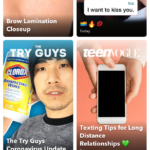In mid-March 2020, in the midst of the COVID-19 pandemic, Teen Vogue (which has a troubling history with teenagers and sexual exploitation) posted a Snapchat Discover story about sexting under the guise of helping teenagers sustain their relationships from a distance.
In case Teen Vogue has forgotten what a “teen” is:
- Teen (noun): relating to teenagers
- Teenager (noun): a person aged between 13 and 19 years.
- Synonyms: adolescent, youth, minor, juvenile
- Minor (noun): a person under the age of full legal responsibility.
- Synonyms: child, infant, youth
Encouraging teens to sext is encouraging minors to create and distribute child pornography, which is more accurately referred to as child sex abuse material (CSAM). Also, online predators use social media platforms to pose as peers and groom children to send them sexually explicit material (i.e. “sext” with them) that they can then distribute and/or use to blackmail the child into other forms of sexual exploitation.
Content promoting and encouraging this dangerous and illegal behavior isn’t okay in any context, but it is particularly troubling in a time when the FBI is warning parents that children are at increased risk of online sexual exploitation while they are stuck at home during COVID-19 school closures.
No less than the health and well-being of our youth is at stake.
Research shows that sexting is often linked to offline sexual coercion. Additionally, sexting and the sending of sexually explicit material via social media apps can lead teens to be sexually extorted, abused, and even trafficked. In this time of uncertainty, when kids will likely find themselves online more frequently, predators are poised to capitalize on increased opportunities to target young adolescents. Research also suggests that young adolescents who practice sexting experience other harmful effects including feelings of terror, stress, difficulty concentrating, and isolation.
In light of all this, one has to ask: why would anyone encourage teenagers to participate in such a problematic and dangerous behavior?
The actions of Teen Vogue and Snapchat are not without consequence and we are calling on Teen Vogue to retract this dangerous content and to replace it with a responsible admonition about the dangers of sexting and online sexual exploitation. Also, Snapchat, we are calling on you to stop allowing third parties to host such content on your platform.
We need you to use your voice to counter this harmful messaging. Complete the easy-to-use Action below to send emails directly to Teen Vogue and Snapchat advocating for them to correct their dangerous missteps. Online child safety is at stake!








